RES801 Research Proposal: AI's Impact on Human Capital in Marketing
VerifiedAdded on 2022/08/21
|13
|4385
|15
Report
AI Summary
This report presents a research proposal examining the impact of artificial intelligence (AI) on human capital within the marketing field. The introduction highlights AI's increasing role in improving efficiency and its influence on various business functions, including marketing, HR, and talent acquisition. The research aims to identify AI's impact on human capital, explore the understanding of AI and human capital, recommend strategies to improve human capital through AI, and investigate the use of AI in human capital management. The literature review explores the definition of AI and human capital, addresses the effects of AI on human capital, and suggests strategies for improvement. It covers topics such as AI's role in reducing bias in recruitment, its impact on employee training and compensation, and its use in talent acquisition. The report also discusses ethical considerations, limitations, and data collection methods. The conclusion summarizes the key findings and implications of the research, emphasizing the transformative potential of AI in reshaping human capital management and marketing strategies.

Marketing
Paraphrase This Document
Need a fresh take? Get an instant paraphrase of this document with our AI Paraphraser
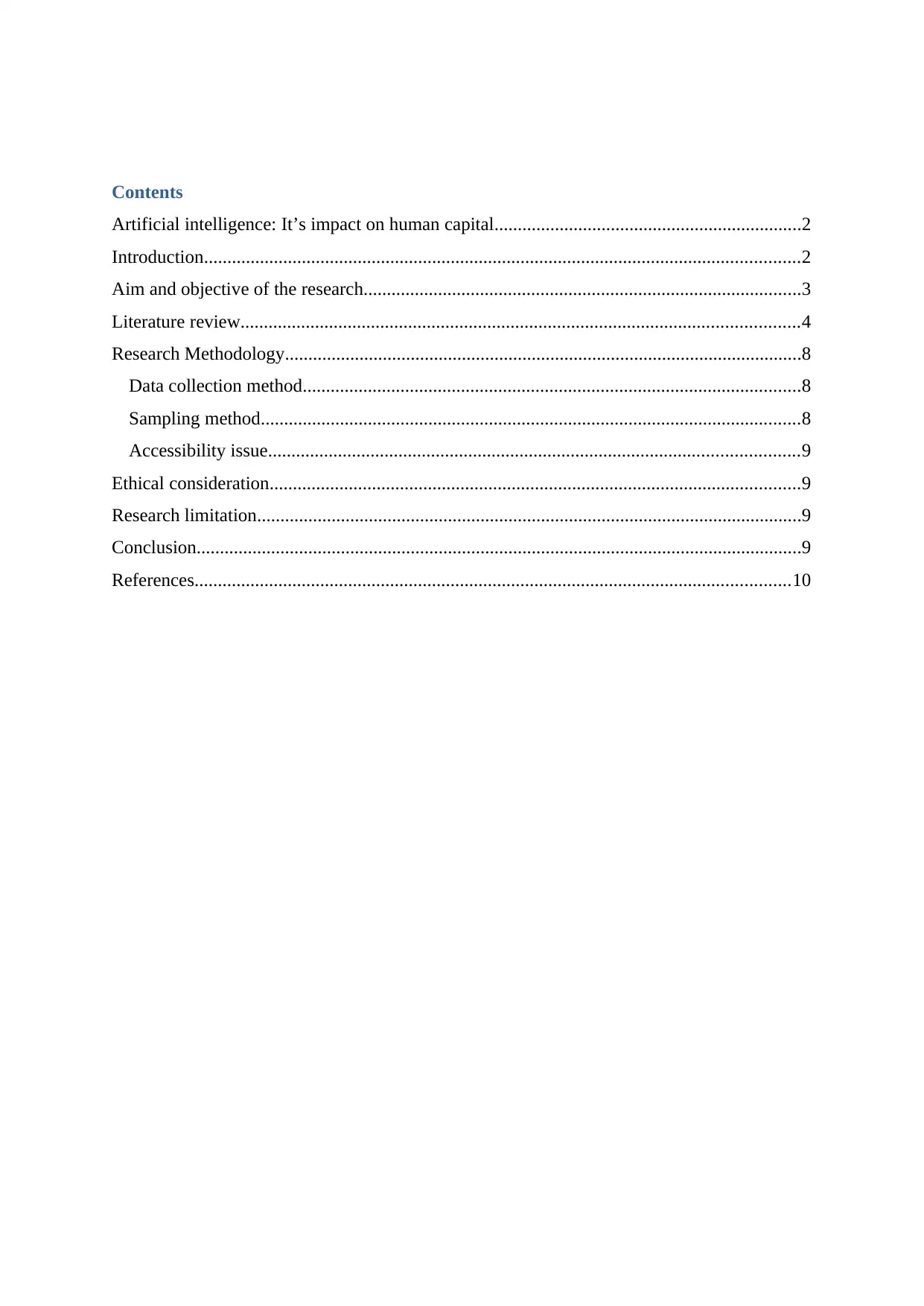
Contents
Artificial intelligence: It’s impact on human capital..................................................................2
Introduction................................................................................................................................2
Aim and objective of the research..............................................................................................3
Literature review........................................................................................................................4
Research Methodology...............................................................................................................8
Data collection method...........................................................................................................8
Sampling method....................................................................................................................8
Accessibility issue..................................................................................................................9
Ethical consideration..................................................................................................................9
Research limitation.....................................................................................................................9
Conclusion..................................................................................................................................9
References................................................................................................................................10
Artificial intelligence: It’s impact on human capital..................................................................2
Introduction................................................................................................................................2
Aim and objective of the research..............................................................................................3
Literature review........................................................................................................................4
Research Methodology...............................................................................................................8
Data collection method...........................................................................................................8
Sampling method....................................................................................................................8
Accessibility issue..................................................................................................................9
Ethical consideration..................................................................................................................9
Research limitation.....................................................................................................................9
Conclusion..................................................................................................................................9
References................................................................................................................................10
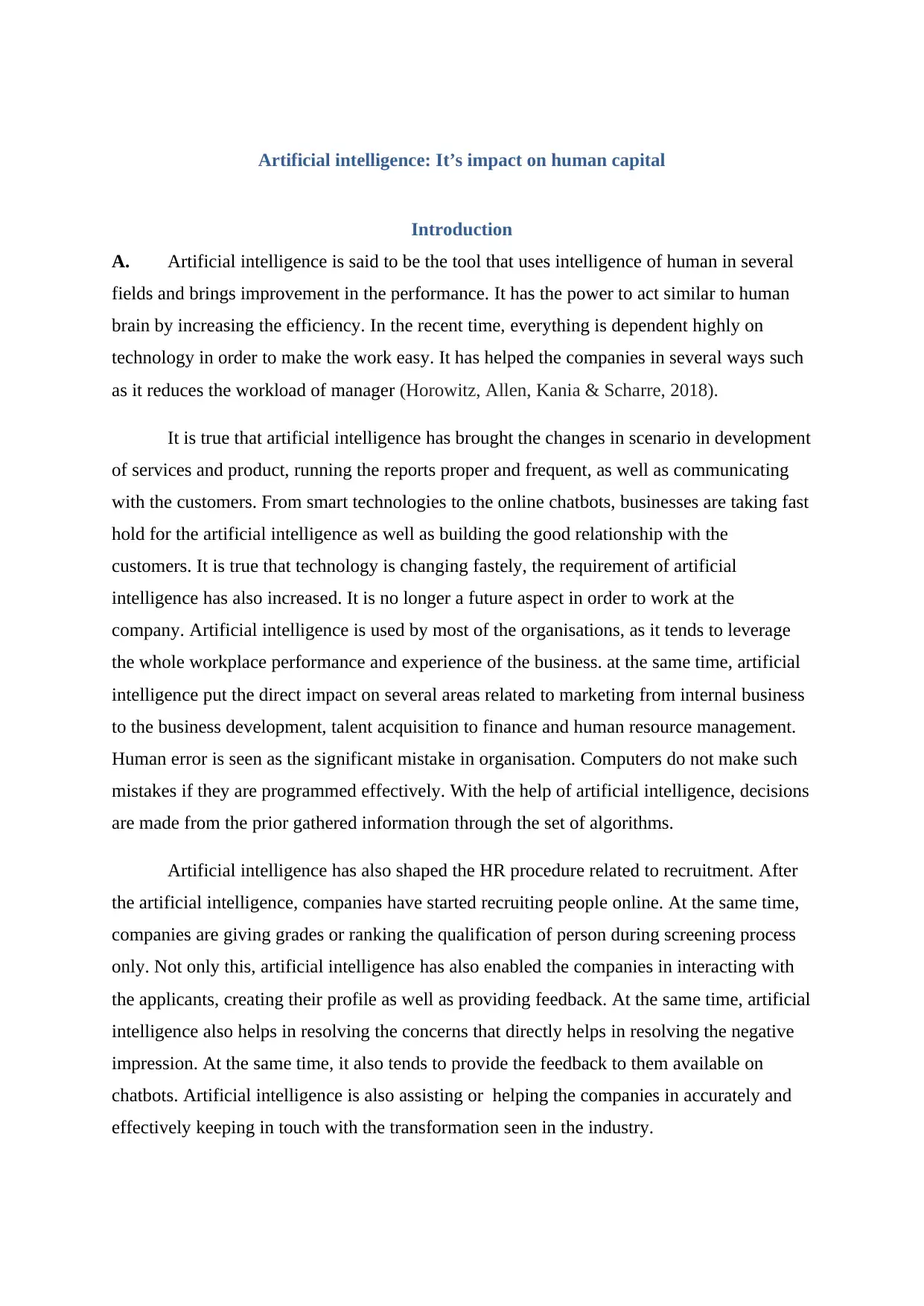
Artificial intelligence: It’s impact on human capital
Introduction
A. Artificial intelligence is said to be the tool that uses intelligence of human in several
fields and brings improvement in the performance. It has the power to act similar to human
brain by increasing the efficiency. In the recent time, everything is dependent highly on
technology in order to make the work easy. It has helped the companies in several ways such
as it reduces the workload of manager (Horowitz, Allen, Kania & Scharre, 2018).
It is true that artificial intelligence has brought the changes in scenario in development
of services and product, running the reports proper and frequent, as well as communicating
with the customers. From smart technologies to the online chatbots, businesses are taking fast
hold for the artificial intelligence as well as building the good relationship with the
customers. It is true that technology is changing fastely, the requirement of artificial
intelligence has also increased. It is no longer a future aspect in order to work at the
company. Artificial intelligence is used by most of the organisations, as it tends to leverage
the whole workplace performance and experience of the business. at the same time, artificial
intelligence put the direct impact on several areas related to marketing from internal business
to the business development, talent acquisition to finance and human resource management.
Human error is seen as the significant mistake in organisation. Computers do not make such
mistakes if they are programmed effectively. With the help of artificial intelligence, decisions
are made from the prior gathered information through the set of algorithms.
Artificial intelligence has also shaped the HR procedure related to recruitment. After
the artificial intelligence, companies have started recruiting people online. At the same time,
companies are giving grades or ranking the qualification of person during screening process
only. Not only this, artificial intelligence has also enabled the companies in interacting with
the applicants, creating their profile as well as providing feedback. At the same time, artificial
intelligence also helps in resolving the concerns that directly helps in resolving the negative
impression. At the same time, it also tends to provide the feedback to them available on
chatbots. Artificial intelligence is also assisting or helping the companies in accurately and
effectively keeping in touch with the transformation seen in the industry.
Introduction
A. Artificial intelligence is said to be the tool that uses intelligence of human in several
fields and brings improvement in the performance. It has the power to act similar to human
brain by increasing the efficiency. In the recent time, everything is dependent highly on
technology in order to make the work easy. It has helped the companies in several ways such
as it reduces the workload of manager (Horowitz, Allen, Kania & Scharre, 2018).
It is true that artificial intelligence has brought the changes in scenario in development
of services and product, running the reports proper and frequent, as well as communicating
with the customers. From smart technologies to the online chatbots, businesses are taking fast
hold for the artificial intelligence as well as building the good relationship with the
customers. It is true that technology is changing fastely, the requirement of artificial
intelligence has also increased. It is no longer a future aspect in order to work at the
company. Artificial intelligence is used by most of the organisations, as it tends to leverage
the whole workplace performance and experience of the business. at the same time, artificial
intelligence put the direct impact on several areas related to marketing from internal business
to the business development, talent acquisition to finance and human resource management.
Human error is seen as the significant mistake in organisation. Computers do not make such
mistakes if they are programmed effectively. With the help of artificial intelligence, decisions
are made from the prior gathered information through the set of algorithms.
Artificial intelligence has also shaped the HR procedure related to recruitment. After
the artificial intelligence, companies have started recruiting people online. At the same time,
companies are giving grades or ranking the qualification of person during screening process
only. Not only this, artificial intelligence has also enabled the companies in interacting with
the applicants, creating their profile as well as providing feedback. At the same time, artificial
intelligence also helps in resolving the concerns that directly helps in resolving the negative
impression. At the same time, it also tends to provide the feedback to them available on
chatbots. Artificial intelligence is also assisting or helping the companies in accurately and
effectively keeping in touch with the transformation seen in the industry.
⊘ This is a preview!⊘
Do you want full access?
Subscribe today to unlock all pages.

Trusted by 1+ million students worldwide
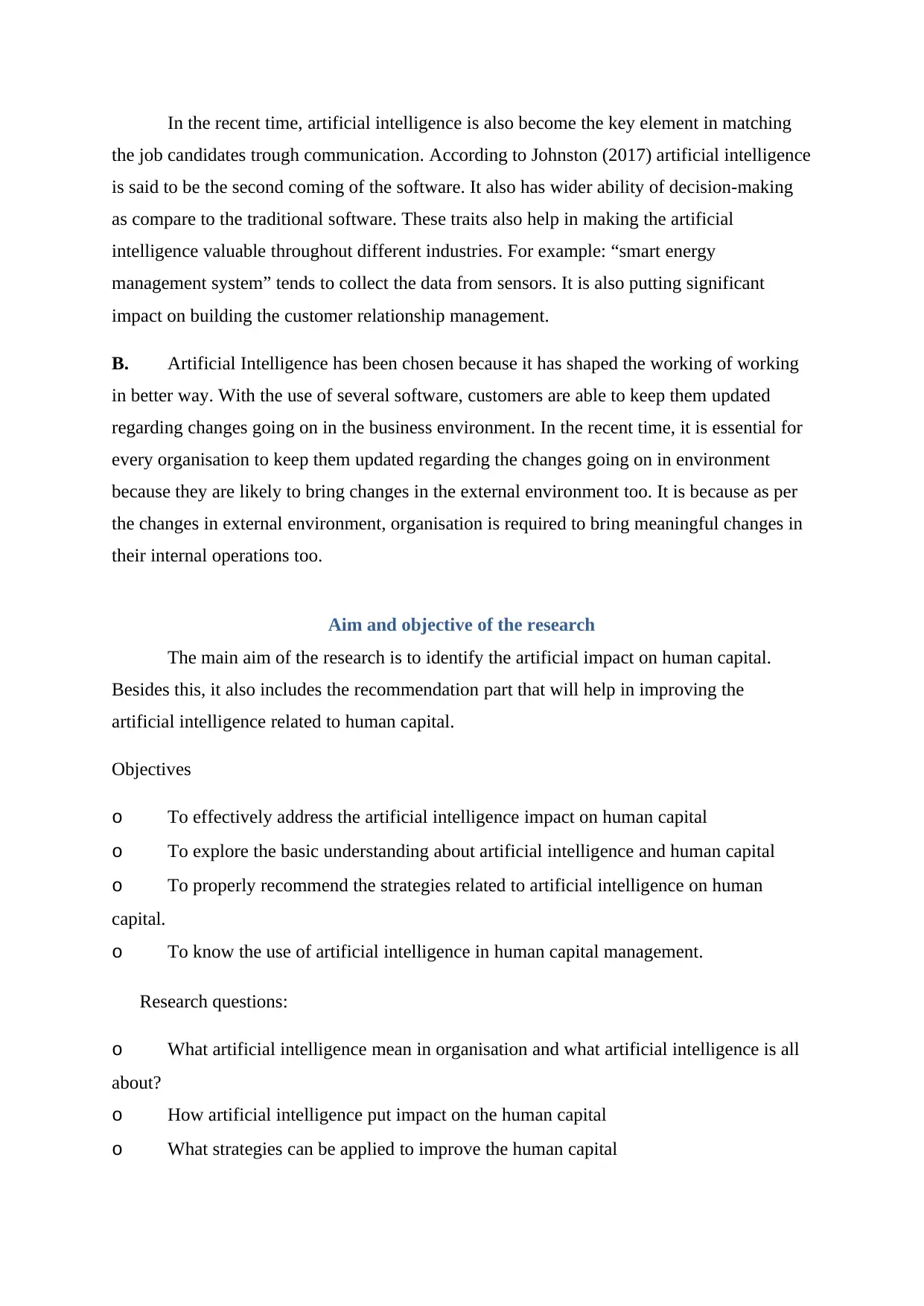
In the recent time, artificial intelligence is also become the key element in matching
the job candidates trough communication. According to Johnston (2017) artificial intelligence
is said to be the second coming of the software. It also has wider ability of decision-making
as compare to the traditional software. These traits also help in making the artificial
intelligence valuable throughout different industries. For example: “smart energy
management system” tends to collect the data from sensors. It is also putting significant
impact on building the customer relationship management.
B. Artificial Intelligence has been chosen because it has shaped the working of working
in better way. With the use of several software, customers are able to keep them updated
regarding changes going on in the business environment. In the recent time, it is essential for
every organisation to keep them updated regarding the changes going on in environment
because they are likely to bring changes in the external environment too. It is because as per
the changes in external environment, organisation is required to bring meaningful changes in
their internal operations too.
Aim and objective of the research
The main aim of the research is to identify the artificial impact on human capital.
Besides this, it also includes the recommendation part that will help in improving the
artificial intelligence related to human capital.
Objectives
o To effectively address the artificial intelligence impact on human capital
o To explore the basic understanding about artificial intelligence and human capital
o To properly recommend the strategies related to artificial intelligence on human
capital.
o To know the use of artificial intelligence in human capital management.
Research questions:
o What artificial intelligence mean in organisation and what artificial intelligence is all
about?
o How artificial intelligence put impact on the human capital
o What strategies can be applied to improve the human capital
the job candidates trough communication. According to Johnston (2017) artificial intelligence
is said to be the second coming of the software. It also has wider ability of decision-making
as compare to the traditional software. These traits also help in making the artificial
intelligence valuable throughout different industries. For example: “smart energy
management system” tends to collect the data from sensors. It is also putting significant
impact on building the customer relationship management.
B. Artificial Intelligence has been chosen because it has shaped the working of working
in better way. With the use of several software, customers are able to keep them updated
regarding changes going on in the business environment. In the recent time, it is essential for
every organisation to keep them updated regarding the changes going on in environment
because they are likely to bring changes in the external environment too. It is because as per
the changes in external environment, organisation is required to bring meaningful changes in
their internal operations too.
Aim and objective of the research
The main aim of the research is to identify the artificial impact on human capital.
Besides this, it also includes the recommendation part that will help in improving the
artificial intelligence related to human capital.
Objectives
o To effectively address the artificial intelligence impact on human capital
o To explore the basic understanding about artificial intelligence and human capital
o To properly recommend the strategies related to artificial intelligence on human
capital.
o To know the use of artificial intelligence in human capital management.
Research questions:
o What artificial intelligence mean in organisation and what artificial intelligence is all
about?
o How artificial intelligence put impact on the human capital
o What strategies can be applied to improve the human capital
Paraphrase This Document
Need a fresh take? Get an instant paraphrase of this document with our AI Paraphraser
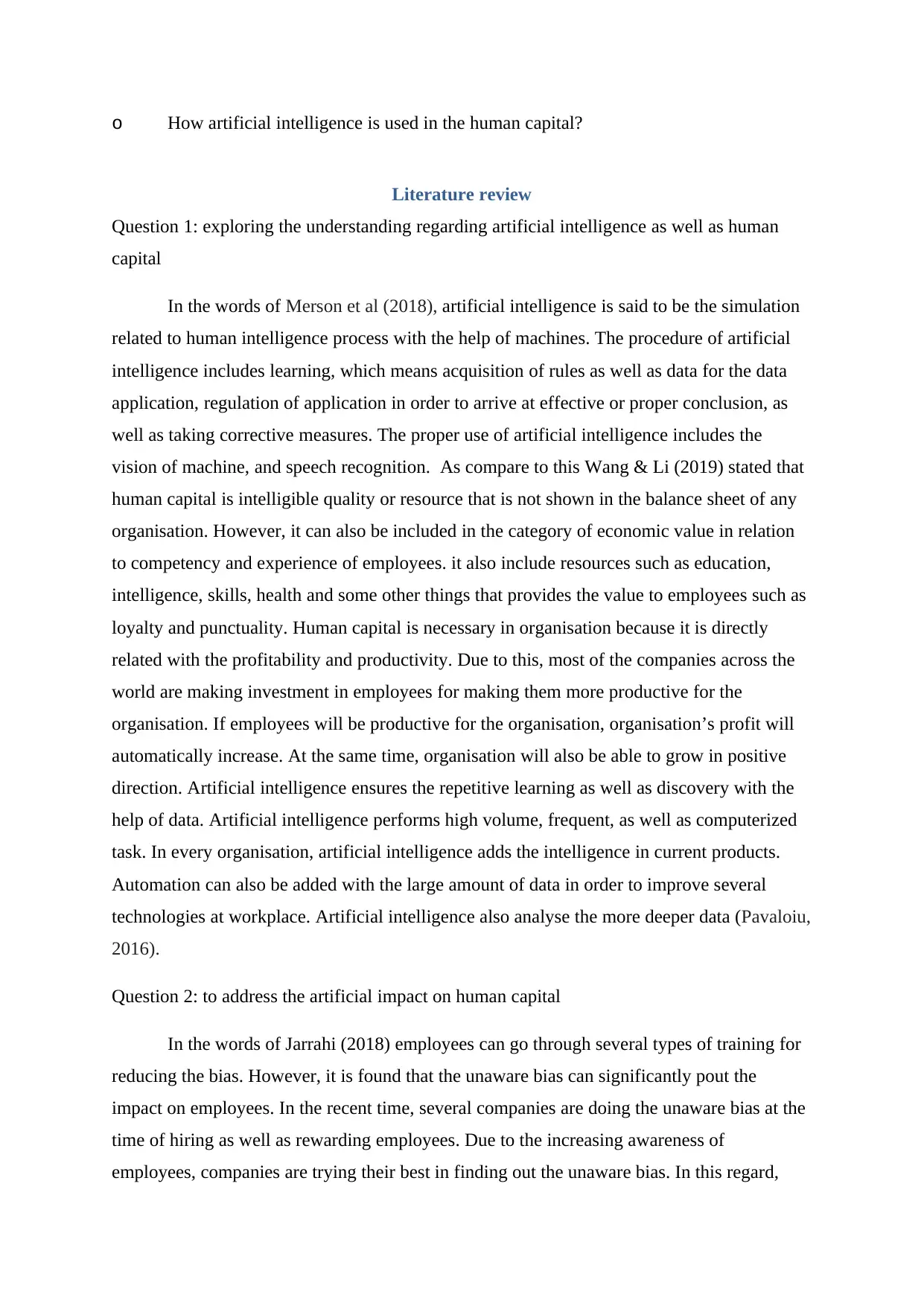
o How artificial intelligence is used in the human capital?
Literature review
Question 1: exploring the understanding regarding artificial intelligence as well as human
capital
In the words of Merson et al (2018), artificial intelligence is said to be the simulation
related to human intelligence process with the help of machines. The procedure of artificial
intelligence includes learning, which means acquisition of rules as well as data for the data
application, regulation of application in order to arrive at effective or proper conclusion, as
well as taking corrective measures. The proper use of artificial intelligence includes the
vision of machine, and speech recognition. As compare to this Wang & Li (2019) stated that
human capital is intelligible quality or resource that is not shown in the balance sheet of any
organisation. However, it can also be included in the category of economic value in relation
to competency and experience of employees. it also include resources such as education,
intelligence, skills, health and some other things that provides the value to employees such as
loyalty and punctuality. Human capital is necessary in organisation because it is directly
related with the profitability and productivity. Due to this, most of the companies across the
world are making investment in employees for making them more productive for the
organisation. If employees will be productive for the organisation, organisation’s profit will
automatically increase. At the same time, organisation will also be able to grow in positive
direction. Artificial intelligence ensures the repetitive learning as well as discovery with the
help of data. Artificial intelligence performs high volume, frequent, as well as computerized
task. In every organisation, artificial intelligence adds the intelligence in current products.
Automation can also be added with the large amount of data in order to improve several
technologies at workplace. Artificial intelligence also analyse the more deeper data (Pavaloiu,
2016).
Question 2: to address the artificial impact on human capital
In the words of Jarrahi (2018) employees can go through several types of training for
reducing the bias. However, it is found that the unaware bias can significantly pout the
impact on employees. In the recent time, several companies are doing the unaware bias at the
time of hiring as well as rewarding employees. Due to the increasing awareness of
employees, companies are trying their best in finding out the unaware bias. In this regard,
Literature review
Question 1: exploring the understanding regarding artificial intelligence as well as human
capital
In the words of Merson et al (2018), artificial intelligence is said to be the simulation
related to human intelligence process with the help of machines. The procedure of artificial
intelligence includes learning, which means acquisition of rules as well as data for the data
application, regulation of application in order to arrive at effective or proper conclusion, as
well as taking corrective measures. The proper use of artificial intelligence includes the
vision of machine, and speech recognition. As compare to this Wang & Li (2019) stated that
human capital is intelligible quality or resource that is not shown in the balance sheet of any
organisation. However, it can also be included in the category of economic value in relation
to competency and experience of employees. it also include resources such as education,
intelligence, skills, health and some other things that provides the value to employees such as
loyalty and punctuality. Human capital is necessary in organisation because it is directly
related with the profitability and productivity. Due to this, most of the companies across the
world are making investment in employees for making them more productive for the
organisation. If employees will be productive for the organisation, organisation’s profit will
automatically increase. At the same time, organisation will also be able to grow in positive
direction. Artificial intelligence ensures the repetitive learning as well as discovery with the
help of data. Artificial intelligence performs high volume, frequent, as well as computerized
task. In every organisation, artificial intelligence adds the intelligence in current products.
Automation can also be added with the large amount of data in order to improve several
technologies at workplace. Artificial intelligence also analyse the more deeper data (Pavaloiu,
2016).
Question 2: to address the artificial impact on human capital
In the words of Jarrahi (2018) employees can go through several types of training for
reducing the bias. However, it is found that the unaware bias can significantly pout the
impact on employees. In the recent time, several companies are doing the unaware bias at the
time of hiring as well as rewarding employees. Due to the increasing awareness of
employees, companies are trying their best in finding out the unaware bias. In this regard,
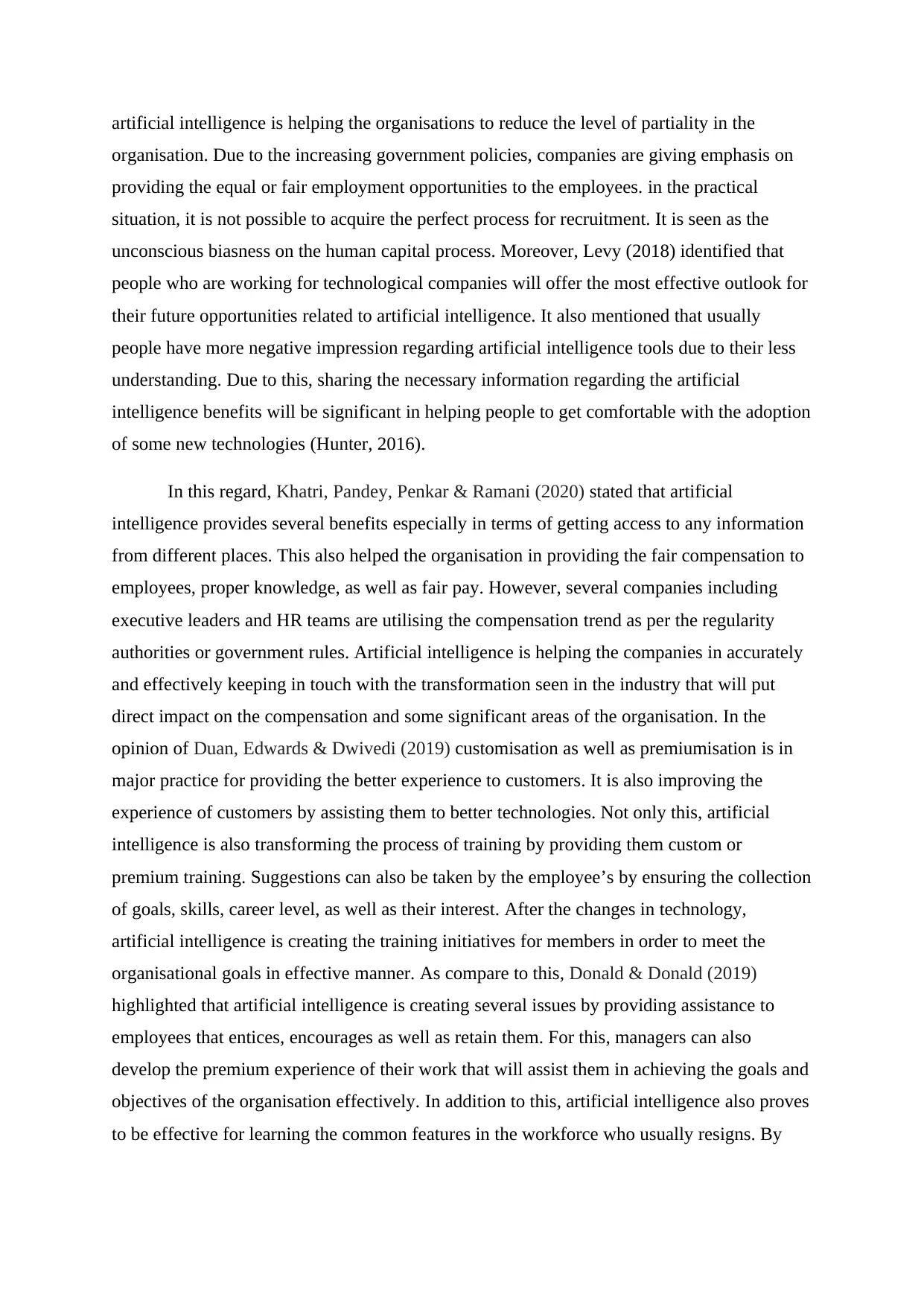
artificial intelligence is helping the organisations to reduce the level of partiality in the
organisation. Due to the increasing government policies, companies are giving emphasis on
providing the equal or fair employment opportunities to the employees. in the practical
situation, it is not possible to acquire the perfect process for recruitment. It is seen as the
unconscious biasness on the human capital process. Moreover, Levy (2018) identified that
people who are working for technological companies will offer the most effective outlook for
their future opportunities related to artificial intelligence. It also mentioned that usually
people have more negative impression regarding artificial intelligence tools due to their less
understanding. Due to this, sharing the necessary information regarding the artificial
intelligence benefits will be significant in helping people to get comfortable with the adoption
of some new technologies (Hunter, 2016).
In this regard, Khatri, Pandey, Penkar & Ramani (2020) stated that artificial
intelligence provides several benefits especially in terms of getting access to any information
from different places. This also helped the organisation in providing the fair compensation to
employees, proper knowledge, as well as fair pay. However, several companies including
executive leaders and HR teams are utilising the compensation trend as per the regularity
authorities or government rules. Artificial intelligence is helping the companies in accurately
and effectively keeping in touch with the transformation seen in the industry that will put
direct impact on the compensation and some significant areas of the organisation. In the
opinion of Duan, Edwards & Dwivedi (2019) customisation as well as premiumisation is in
major practice for providing the better experience to customers. It is also improving the
experience of customers by assisting them to better technologies. Not only this, artificial
intelligence is also transforming the process of training by providing them custom or
premium training. Suggestions can also be taken by the employee’s by ensuring the collection
of goals, skills, career level, as well as their interest. After the changes in technology,
artificial intelligence is creating the training initiatives for members in order to meet the
organisational goals in effective manner. As compare to this, Donald & Donald (2019)
highlighted that artificial intelligence is creating several issues by providing assistance to
employees that entices, encourages as well as retain them. For this, managers can also
develop the premium experience of their work that will assist them in achieving the goals and
objectives of the organisation effectively. In addition to this, artificial intelligence also proves
to be effective for learning the common features in the workforce who usually resigns. By
organisation. Due to the increasing government policies, companies are giving emphasis on
providing the equal or fair employment opportunities to the employees. in the practical
situation, it is not possible to acquire the perfect process for recruitment. It is seen as the
unconscious biasness on the human capital process. Moreover, Levy (2018) identified that
people who are working for technological companies will offer the most effective outlook for
their future opportunities related to artificial intelligence. It also mentioned that usually
people have more negative impression regarding artificial intelligence tools due to their less
understanding. Due to this, sharing the necessary information regarding the artificial
intelligence benefits will be significant in helping people to get comfortable with the adoption
of some new technologies (Hunter, 2016).
In this regard, Khatri, Pandey, Penkar & Ramani (2020) stated that artificial
intelligence provides several benefits especially in terms of getting access to any information
from different places. This also helped the organisation in providing the fair compensation to
employees, proper knowledge, as well as fair pay. However, several companies including
executive leaders and HR teams are utilising the compensation trend as per the regularity
authorities or government rules. Artificial intelligence is helping the companies in accurately
and effectively keeping in touch with the transformation seen in the industry that will put
direct impact on the compensation and some significant areas of the organisation. In the
opinion of Duan, Edwards & Dwivedi (2019) customisation as well as premiumisation is in
major practice for providing the better experience to customers. It is also improving the
experience of customers by assisting them to better technologies. Not only this, artificial
intelligence is also transforming the process of training by providing them custom or
premium training. Suggestions can also be taken by the employee’s by ensuring the collection
of goals, skills, career level, as well as their interest. After the changes in technology,
artificial intelligence is creating the training initiatives for members in order to meet the
organisational goals in effective manner. As compare to this, Donald & Donald (2019)
highlighted that artificial intelligence is creating several issues by providing assistance to
employees that entices, encourages as well as retain them. For this, managers can also
develop the premium experience of their work that will assist them in achieving the goals and
objectives of the organisation effectively. In addition to this, artificial intelligence also proves
to be effective for learning the common features in the workforce who usually resigns. By
⊘ This is a preview!⊘
Do you want full access?
Subscribe today to unlock all pages.

Trusted by 1+ million students worldwide
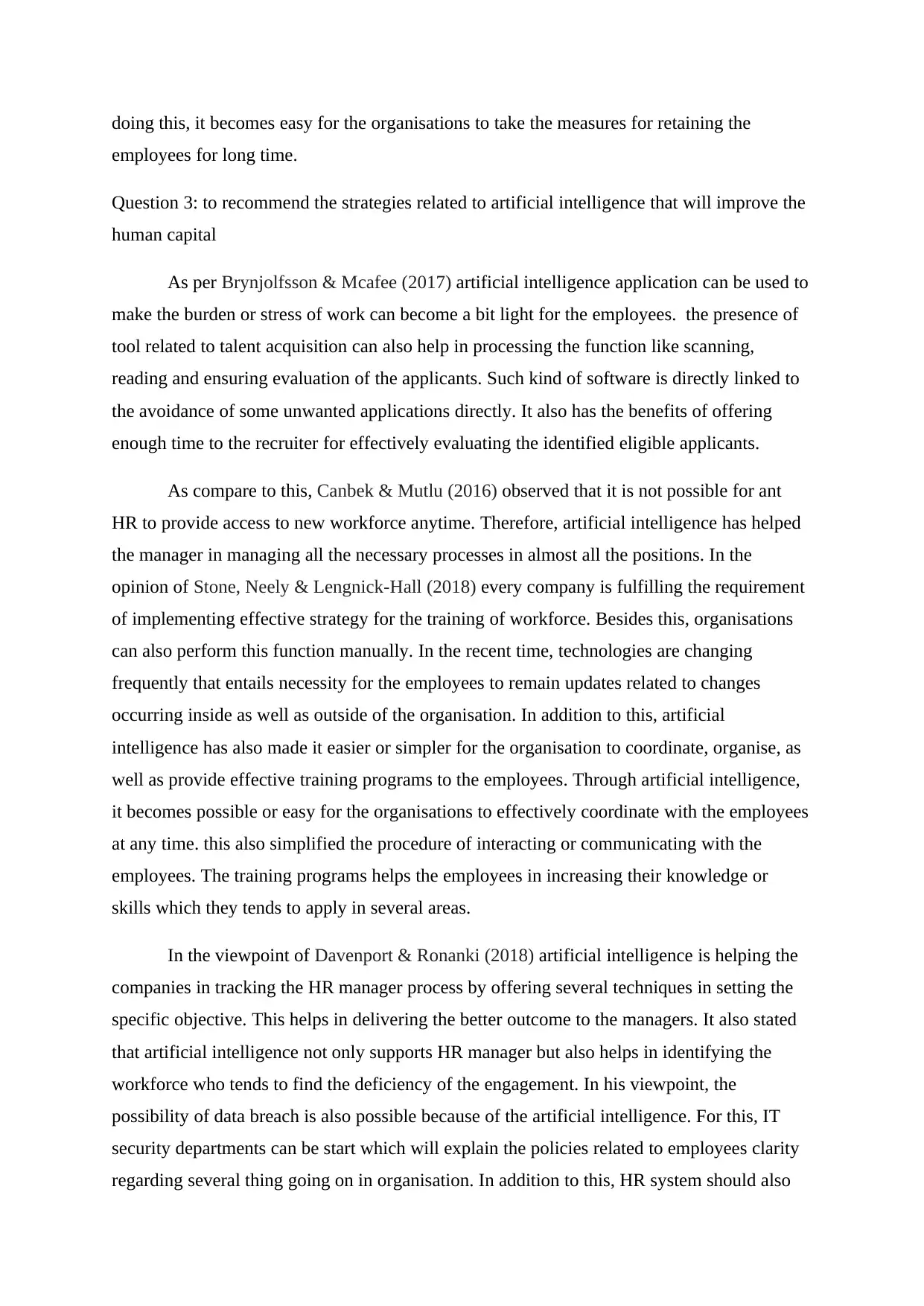
doing this, it becomes easy for the organisations to take the measures for retaining the
employees for long time.
Question 3: to recommend the strategies related to artificial intelligence that will improve the
human capital
As per Brynjolfsson & Mcafee (2017) artificial intelligence application can be used to
make the burden or stress of work can become a bit light for the employees. the presence of
tool related to talent acquisition can also help in processing the function like scanning,
reading and ensuring evaluation of the applicants. Such kind of software is directly linked to
the avoidance of some unwanted applications directly. It also has the benefits of offering
enough time to the recruiter for effectively evaluating the identified eligible applicants.
As compare to this, Canbek & Mutlu (2016) observed that it is not possible for ant
HR to provide access to new workforce anytime. Therefore, artificial intelligence has helped
the manager in managing all the necessary processes in almost all the positions. In the
opinion of Stone, Neely & Lengnick-Hall (2018) every company is fulfilling the requirement
of implementing effective strategy for the training of workforce. Besides this, organisations
can also perform this function manually. In the recent time, technologies are changing
frequently that entails necessity for the employees to remain updates related to changes
occurring inside as well as outside of the organisation. In addition to this, artificial
intelligence has also made it easier or simpler for the organisation to coordinate, organise, as
well as provide effective training programs to the employees. Through artificial intelligence,
it becomes possible or easy for the organisations to effectively coordinate with the employees
at any time. this also simplified the procedure of interacting or communicating with the
employees. The training programs helps the employees in increasing their knowledge or
skills which they tends to apply in several areas.
In the viewpoint of Davenport & Ronanki (2018) artificial intelligence is helping the
companies in tracking the HR manager process by offering several techniques in setting the
specific objective. This helps in delivering the better outcome to the managers. It also stated
that artificial intelligence not only supports HR manager but also helps in identifying the
workforce who tends to find the deficiency of the engagement. In his viewpoint, the
possibility of data breach is also possible because of the artificial intelligence. For this, IT
security departments can be start which will explain the policies related to employees clarity
regarding several thing going on in organisation. In addition to this, HR system should also
employees for long time.
Question 3: to recommend the strategies related to artificial intelligence that will improve the
human capital
As per Brynjolfsson & Mcafee (2017) artificial intelligence application can be used to
make the burden or stress of work can become a bit light for the employees. the presence of
tool related to talent acquisition can also help in processing the function like scanning,
reading and ensuring evaluation of the applicants. Such kind of software is directly linked to
the avoidance of some unwanted applications directly. It also has the benefits of offering
enough time to the recruiter for effectively evaluating the identified eligible applicants.
As compare to this, Canbek & Mutlu (2016) observed that it is not possible for ant
HR to provide access to new workforce anytime. Therefore, artificial intelligence has helped
the manager in managing all the necessary processes in almost all the positions. In the
opinion of Stone, Neely & Lengnick-Hall (2018) every company is fulfilling the requirement
of implementing effective strategy for the training of workforce. Besides this, organisations
can also perform this function manually. In the recent time, technologies are changing
frequently that entails necessity for the employees to remain updates related to changes
occurring inside as well as outside of the organisation. In addition to this, artificial
intelligence has also made it easier or simpler for the organisation to coordinate, organise, as
well as provide effective training programs to the employees. Through artificial intelligence,
it becomes possible or easy for the organisations to effectively coordinate with the employees
at any time. this also simplified the procedure of interacting or communicating with the
employees. The training programs helps the employees in increasing their knowledge or
skills which they tends to apply in several areas.
In the viewpoint of Davenport & Ronanki (2018) artificial intelligence is helping the
companies in tracking the HR manager process by offering several techniques in setting the
specific objective. This helps in delivering the better outcome to the managers. It also stated
that artificial intelligence not only supports HR manager but also helps in identifying the
workforce who tends to find the deficiency of the engagement. In his viewpoint, the
possibility of data breach is also possible because of the artificial intelligence. For this, IT
security departments can be start which will explain the policies related to employees clarity
regarding several thing going on in organisation. In addition to this, HR system should also
Paraphrase This Document
Need a fresh take? Get an instant paraphrase of this document with our AI Paraphraser
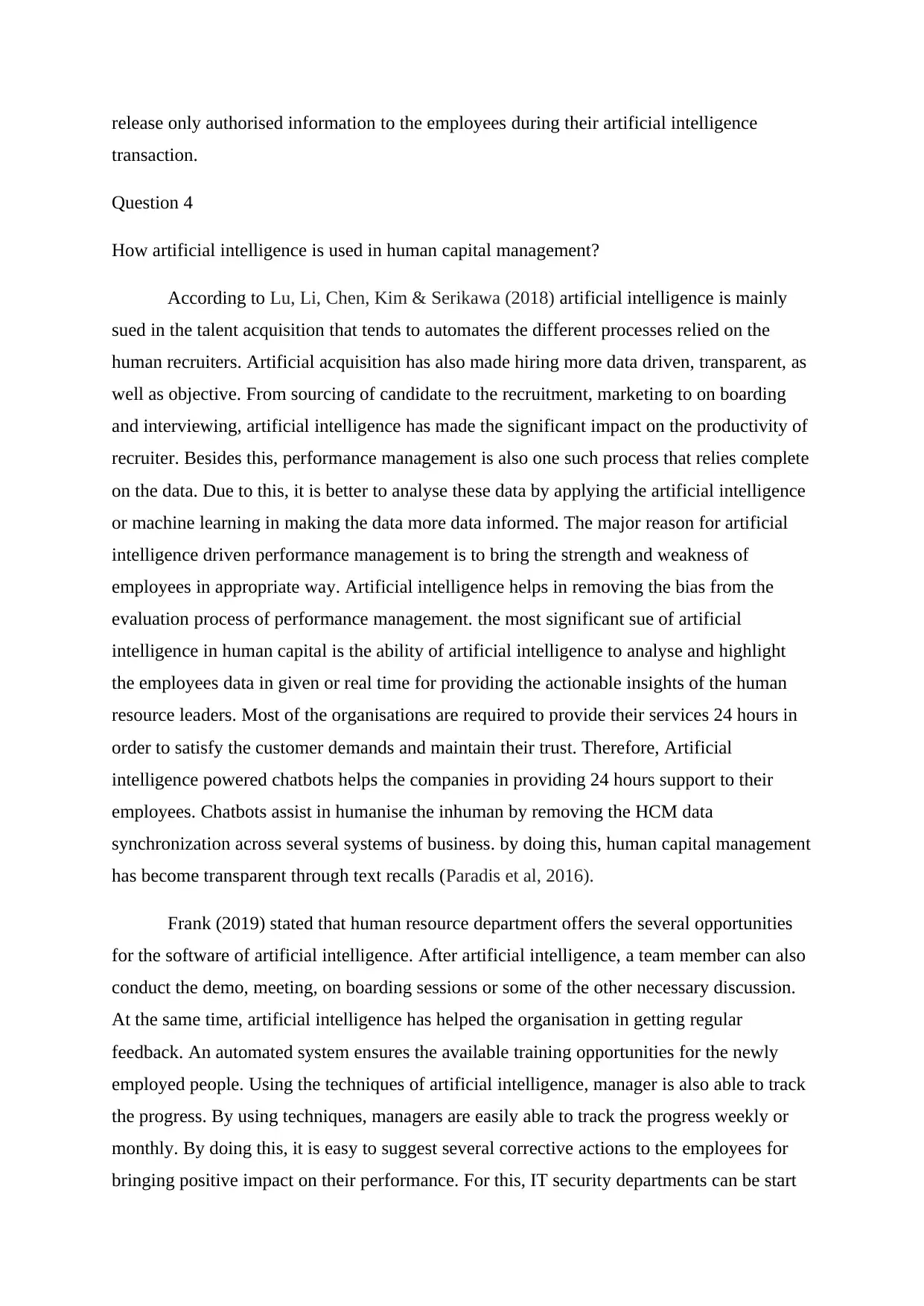
release only authorised information to the employees during their artificial intelligence
transaction.
Question 4
How artificial intelligence is used in human capital management?
According to Lu, Li, Chen, Kim & Serikawa (2018) artificial intelligence is mainly
sued in the talent acquisition that tends to automates the different processes relied on the
human recruiters. Artificial acquisition has also made hiring more data driven, transparent, as
well as objective. From sourcing of candidate to the recruitment, marketing to on boarding
and interviewing, artificial intelligence has made the significant impact on the productivity of
recruiter. Besides this, performance management is also one such process that relies complete
on the data. Due to this, it is better to analyse these data by applying the artificial intelligence
or machine learning in making the data more data informed. The major reason for artificial
intelligence driven performance management is to bring the strength and weakness of
employees in appropriate way. Artificial intelligence helps in removing the bias from the
evaluation process of performance management. the most significant sue of artificial
intelligence in human capital is the ability of artificial intelligence to analyse and highlight
the employees data in given or real time for providing the actionable insights of the human
resource leaders. Most of the organisations are required to provide their services 24 hours in
order to satisfy the customer demands and maintain their trust. Therefore, Artificial
intelligence powered chatbots helps the companies in providing 24 hours support to their
employees. Chatbots assist in humanise the inhuman by removing the HCM data
synchronization across several systems of business. by doing this, human capital management
has become transparent through text recalls (Paradis et al, 2016).
Frank (2019) stated that human resource department offers the several opportunities
for the software of artificial intelligence. After artificial intelligence, a team member can also
conduct the demo, meeting, on boarding sessions or some of the other necessary discussion.
At the same time, artificial intelligence has helped the organisation in getting regular
feedback. An automated system ensures the available training opportunities for the newly
employed people. Using the techniques of artificial intelligence, manager is also able to track
the progress. By using techniques, managers are easily able to track the progress weekly or
monthly. By doing this, it is easy to suggest several corrective actions to the employees for
bringing positive impact on their performance. For this, IT security departments can be start
transaction.
Question 4
How artificial intelligence is used in human capital management?
According to Lu, Li, Chen, Kim & Serikawa (2018) artificial intelligence is mainly
sued in the talent acquisition that tends to automates the different processes relied on the
human recruiters. Artificial acquisition has also made hiring more data driven, transparent, as
well as objective. From sourcing of candidate to the recruitment, marketing to on boarding
and interviewing, artificial intelligence has made the significant impact on the productivity of
recruiter. Besides this, performance management is also one such process that relies complete
on the data. Due to this, it is better to analyse these data by applying the artificial intelligence
or machine learning in making the data more data informed. The major reason for artificial
intelligence driven performance management is to bring the strength and weakness of
employees in appropriate way. Artificial intelligence helps in removing the bias from the
evaluation process of performance management. the most significant sue of artificial
intelligence in human capital is the ability of artificial intelligence to analyse and highlight
the employees data in given or real time for providing the actionable insights of the human
resource leaders. Most of the organisations are required to provide their services 24 hours in
order to satisfy the customer demands and maintain their trust. Therefore, Artificial
intelligence powered chatbots helps the companies in providing 24 hours support to their
employees. Chatbots assist in humanise the inhuman by removing the HCM data
synchronization across several systems of business. by doing this, human capital management
has become transparent through text recalls (Paradis et al, 2016).
Frank (2019) stated that human resource department offers the several opportunities
for the software of artificial intelligence. After artificial intelligence, a team member can also
conduct the demo, meeting, on boarding sessions or some of the other necessary discussion.
At the same time, artificial intelligence has helped the organisation in getting regular
feedback. An automated system ensures the available training opportunities for the newly
employed people. Using the techniques of artificial intelligence, manager is also able to track
the progress. By using techniques, managers are easily able to track the progress weekly or
monthly. By doing this, it is easy to suggest several corrective actions to the employees for
bringing positive impact on their performance. For this, IT security departments can be start
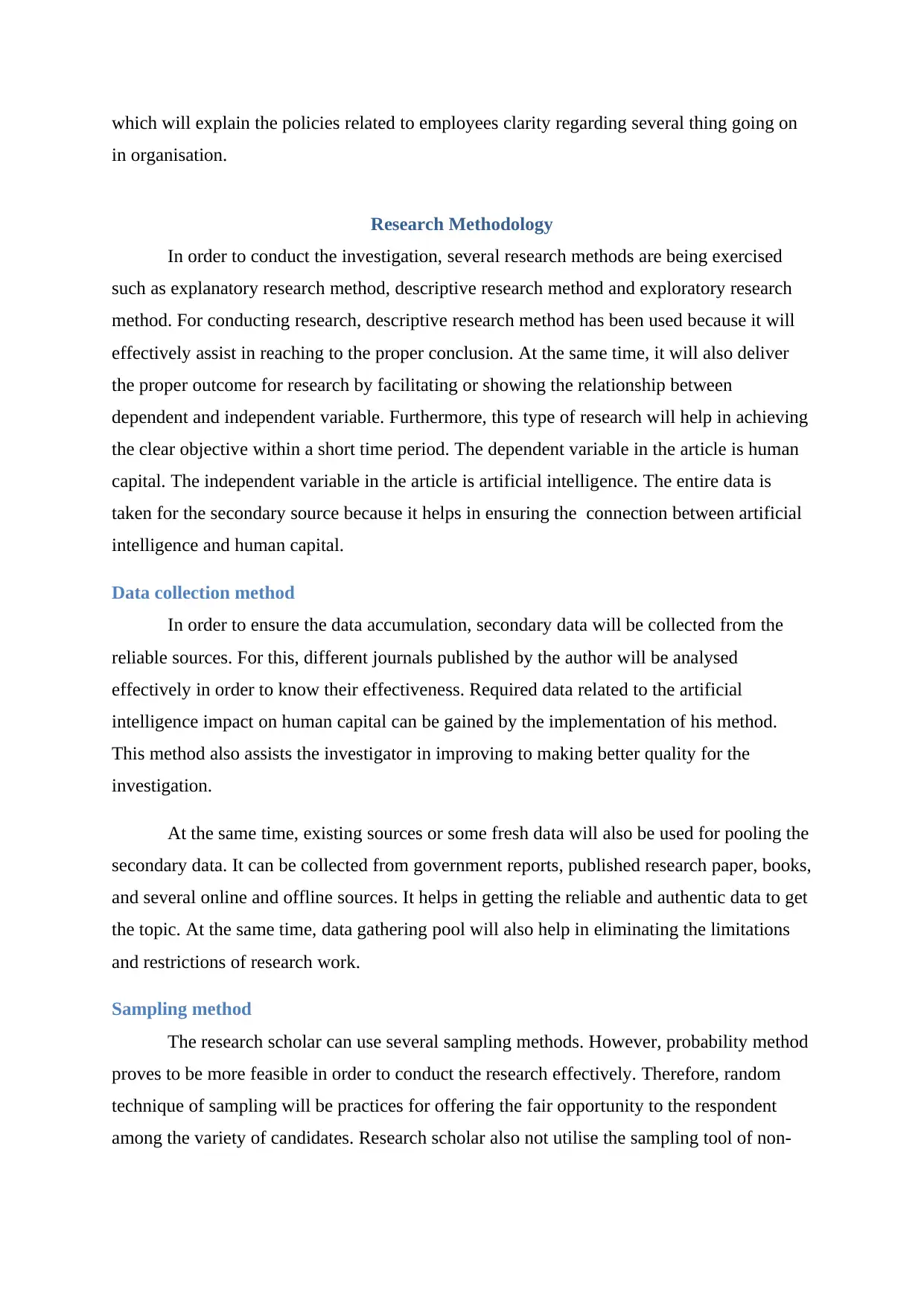
which will explain the policies related to employees clarity regarding several thing going on
in organisation.
Research Methodology
In order to conduct the investigation, several research methods are being exercised
such as explanatory research method, descriptive research method and exploratory research
method. For conducting research, descriptive research method has been used because it will
effectively assist in reaching to the proper conclusion. At the same time, it will also deliver
the proper outcome for research by facilitating or showing the relationship between
dependent and independent variable. Furthermore, this type of research will help in achieving
the clear objective within a short time period. The dependent variable in the article is human
capital. The independent variable in the article is artificial intelligence. The entire data is
taken for the secondary source because it helps in ensuring the connection between artificial
intelligence and human capital.
Data collection method
In order to ensure the data accumulation, secondary data will be collected from the
reliable sources. For this, different journals published by the author will be analysed
effectively in order to know their effectiveness. Required data related to the artificial
intelligence impact on human capital can be gained by the implementation of his method.
This method also assists the investigator in improving to making better quality for the
investigation.
At the same time, existing sources or some fresh data will also be used for pooling the
secondary data. It can be collected from government reports, published research paper, books,
and several online and offline sources. It helps in getting the reliable and authentic data to get
the topic. At the same time, data gathering pool will also help in eliminating the limitations
and restrictions of research work.
Sampling method
The research scholar can use several sampling methods. However, probability method
proves to be more feasible in order to conduct the research effectively. Therefore, random
technique of sampling will be practices for offering the fair opportunity to the respondent
among the variety of candidates. Research scholar also not utilise the sampling tool of non-
in organisation.
Research Methodology
In order to conduct the investigation, several research methods are being exercised
such as explanatory research method, descriptive research method and exploratory research
method. For conducting research, descriptive research method has been used because it will
effectively assist in reaching to the proper conclusion. At the same time, it will also deliver
the proper outcome for research by facilitating or showing the relationship between
dependent and independent variable. Furthermore, this type of research will help in achieving
the clear objective within a short time period. The dependent variable in the article is human
capital. The independent variable in the article is artificial intelligence. The entire data is
taken for the secondary source because it helps in ensuring the connection between artificial
intelligence and human capital.
Data collection method
In order to ensure the data accumulation, secondary data will be collected from the
reliable sources. For this, different journals published by the author will be analysed
effectively in order to know their effectiveness. Required data related to the artificial
intelligence impact on human capital can be gained by the implementation of his method.
This method also assists the investigator in improving to making better quality for the
investigation.
At the same time, existing sources or some fresh data will also be used for pooling the
secondary data. It can be collected from government reports, published research paper, books,
and several online and offline sources. It helps in getting the reliable and authentic data to get
the topic. At the same time, data gathering pool will also help in eliminating the limitations
and restrictions of research work.
Sampling method
The research scholar can use several sampling methods. However, probability method
proves to be more feasible in order to conduct the research effectively. Therefore, random
technique of sampling will be practices for offering the fair opportunity to the respondent
among the variety of candidates. Research scholar also not utilise the sampling tool of non-
⊘ This is a preview!⊘
Do you want full access?
Subscribe today to unlock all pages.

Trusted by 1+ million students worldwide
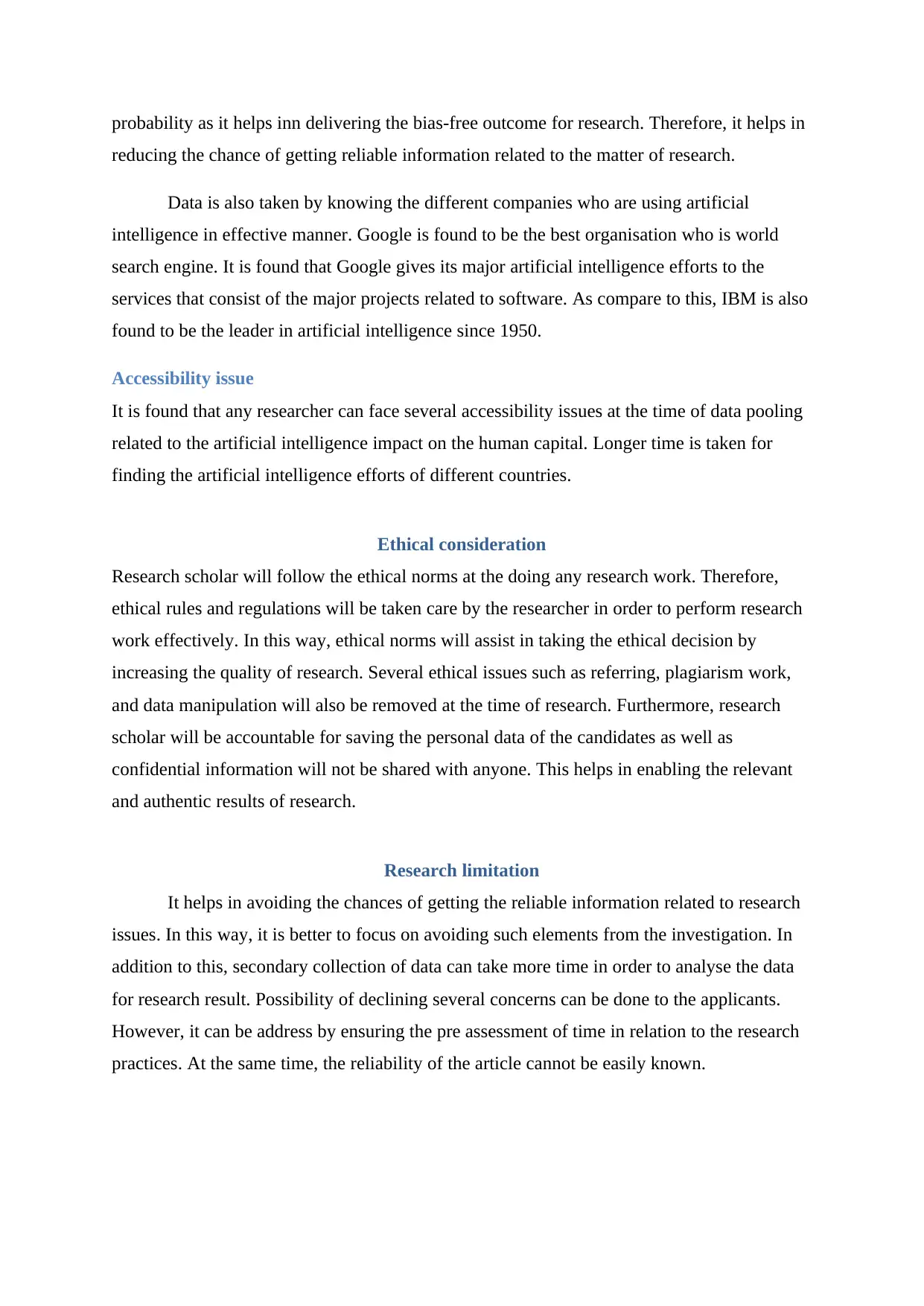
probability as it helps inn delivering the bias-free outcome for research. Therefore, it helps in
reducing the chance of getting reliable information related to the matter of research.
Data is also taken by knowing the different companies who are using artificial
intelligence in effective manner. Google is found to be the best organisation who is world
search engine. It is found that Google gives its major artificial intelligence efforts to the
services that consist of the major projects related to software. As compare to this, IBM is also
found to be the leader in artificial intelligence since 1950.
Accessibility issue
It is found that any researcher can face several accessibility issues at the time of data pooling
related to the artificial intelligence impact on the human capital. Longer time is taken for
finding the artificial intelligence efforts of different countries.
Ethical consideration
Research scholar will follow the ethical norms at the doing any research work. Therefore,
ethical rules and regulations will be taken care by the researcher in order to perform research
work effectively. In this way, ethical norms will assist in taking the ethical decision by
increasing the quality of research. Several ethical issues such as referring, plagiarism work,
and data manipulation will also be removed at the time of research. Furthermore, research
scholar will be accountable for saving the personal data of the candidates as well as
confidential information will not be shared with anyone. This helps in enabling the relevant
and authentic results of research.
Research limitation
It helps in avoiding the chances of getting the reliable information related to research
issues. In this way, it is better to focus on avoiding such elements from the investigation. In
addition to this, secondary collection of data can take more time in order to analyse the data
for research result. Possibility of declining several concerns can be done to the applicants.
However, it can be address by ensuring the pre assessment of time in relation to the research
practices. At the same time, the reliability of the article cannot be easily known.
reducing the chance of getting reliable information related to the matter of research.
Data is also taken by knowing the different companies who are using artificial
intelligence in effective manner. Google is found to be the best organisation who is world
search engine. It is found that Google gives its major artificial intelligence efforts to the
services that consist of the major projects related to software. As compare to this, IBM is also
found to be the leader in artificial intelligence since 1950.
Accessibility issue
It is found that any researcher can face several accessibility issues at the time of data pooling
related to the artificial intelligence impact on the human capital. Longer time is taken for
finding the artificial intelligence efforts of different countries.
Ethical consideration
Research scholar will follow the ethical norms at the doing any research work. Therefore,
ethical rules and regulations will be taken care by the researcher in order to perform research
work effectively. In this way, ethical norms will assist in taking the ethical decision by
increasing the quality of research. Several ethical issues such as referring, plagiarism work,
and data manipulation will also be removed at the time of research. Furthermore, research
scholar will be accountable for saving the personal data of the candidates as well as
confidential information will not be shared with anyone. This helps in enabling the relevant
and authentic results of research.
Research limitation
It helps in avoiding the chances of getting the reliable information related to research
issues. In this way, it is better to focus on avoiding such elements from the investigation. In
addition to this, secondary collection of data can take more time in order to analyse the data
for research result. Possibility of declining several concerns can be done to the applicants.
However, it can be address by ensuring the pre assessment of time in relation to the research
practices. At the same time, the reliability of the article cannot be easily known.
Paraphrase This Document
Need a fresh take? Get an instant paraphrase of this document with our AI Paraphraser
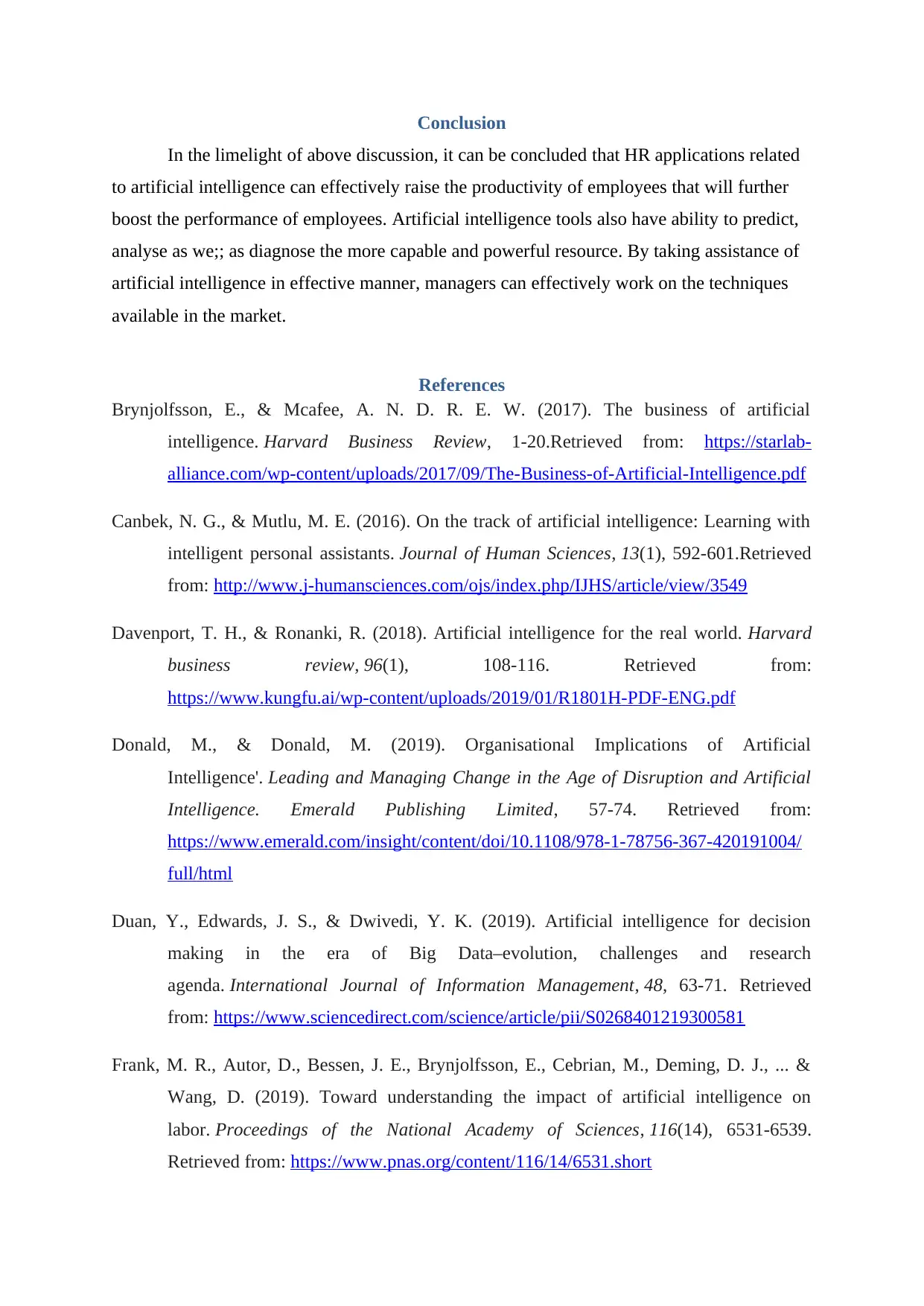
Conclusion
In the limelight of above discussion, it can be concluded that HR applications related
to artificial intelligence can effectively raise the productivity of employees that will further
boost the performance of employees. Artificial intelligence tools also have ability to predict,
analyse as we;; as diagnose the more capable and powerful resource. By taking assistance of
artificial intelligence in effective manner, managers can effectively work on the techniques
available in the market.
References
Brynjolfsson, E., & Mcafee, A. N. D. R. E. W. (2017). The business of artificial
intelligence. Harvard Business Review, 1-20.Retrieved from: https://starlab-
alliance.com/wp-content/uploads/2017/09/The-Business-of-Artificial-Intelligence.pdf
Canbek, N. G., & Mutlu, M. E. (2016). On the track of artificial intelligence: Learning with
intelligent personal assistants. Journal of Human Sciences, 13(1), 592-601.Retrieved
from: http://www.j-humansciences.com/ojs/index.php/IJHS/article/view/3549
Davenport, T. H., & Ronanki, R. (2018). Artificial intelligence for the real world. Harvard
business review, 96(1), 108-116. Retrieved from:
https://www.kungfu.ai/wp-content/uploads/2019/01/R1801H-PDF-ENG.pdf
Donald, M., & Donald, M. (2019). Organisational Implications of Artificial
Intelligence'. Leading and Managing Change in the Age of Disruption and Artificial
Intelligence. Emerald Publishing Limited, 57-74. Retrieved from:
https://www.emerald.com/insight/content/doi/10.1108/978-1-78756-367-420191004/
full/html
Duan, Y., Edwards, J. S., & Dwivedi, Y. K. (2019). Artificial intelligence for decision
making in the era of Big Data–evolution, challenges and research
agenda. International Journal of Information Management, 48, 63-71. Retrieved
from: https://www.sciencedirect.com/science/article/pii/S0268401219300581
Frank, M. R., Autor, D., Bessen, J. E., Brynjolfsson, E., Cebrian, M., Deming, D. J., ... &
Wang, D. (2019). Toward understanding the impact of artificial intelligence on
labor. Proceedings of the National Academy of Sciences, 116(14), 6531-6539.
Retrieved from: https://www.pnas.org/content/116/14/6531.short
In the limelight of above discussion, it can be concluded that HR applications related
to artificial intelligence can effectively raise the productivity of employees that will further
boost the performance of employees. Artificial intelligence tools also have ability to predict,
analyse as we;; as diagnose the more capable and powerful resource. By taking assistance of
artificial intelligence in effective manner, managers can effectively work on the techniques
available in the market.
References
Brynjolfsson, E., & Mcafee, A. N. D. R. E. W. (2017). The business of artificial
intelligence. Harvard Business Review, 1-20.Retrieved from: https://starlab-
alliance.com/wp-content/uploads/2017/09/The-Business-of-Artificial-Intelligence.pdf
Canbek, N. G., & Mutlu, M. E. (2016). On the track of artificial intelligence: Learning with
intelligent personal assistants. Journal of Human Sciences, 13(1), 592-601.Retrieved
from: http://www.j-humansciences.com/ojs/index.php/IJHS/article/view/3549
Davenport, T. H., & Ronanki, R. (2018). Artificial intelligence for the real world. Harvard
business review, 96(1), 108-116. Retrieved from:
https://www.kungfu.ai/wp-content/uploads/2019/01/R1801H-PDF-ENG.pdf
Donald, M., & Donald, M. (2019). Organisational Implications of Artificial
Intelligence'. Leading and Managing Change in the Age of Disruption and Artificial
Intelligence. Emerald Publishing Limited, 57-74. Retrieved from:
https://www.emerald.com/insight/content/doi/10.1108/978-1-78756-367-420191004/
full/html
Duan, Y., Edwards, J. S., & Dwivedi, Y. K. (2019). Artificial intelligence for decision
making in the era of Big Data–evolution, challenges and research
agenda. International Journal of Information Management, 48, 63-71. Retrieved
from: https://www.sciencedirect.com/science/article/pii/S0268401219300581
Frank, M. R., Autor, D., Bessen, J. E., Brynjolfsson, E., Cebrian, M., Deming, D. J., ... &
Wang, D. (2019). Toward understanding the impact of artificial intelligence on
labor. Proceedings of the National Academy of Sciences, 116(14), 6531-6539.
Retrieved from: https://www.pnas.org/content/116/14/6531.short
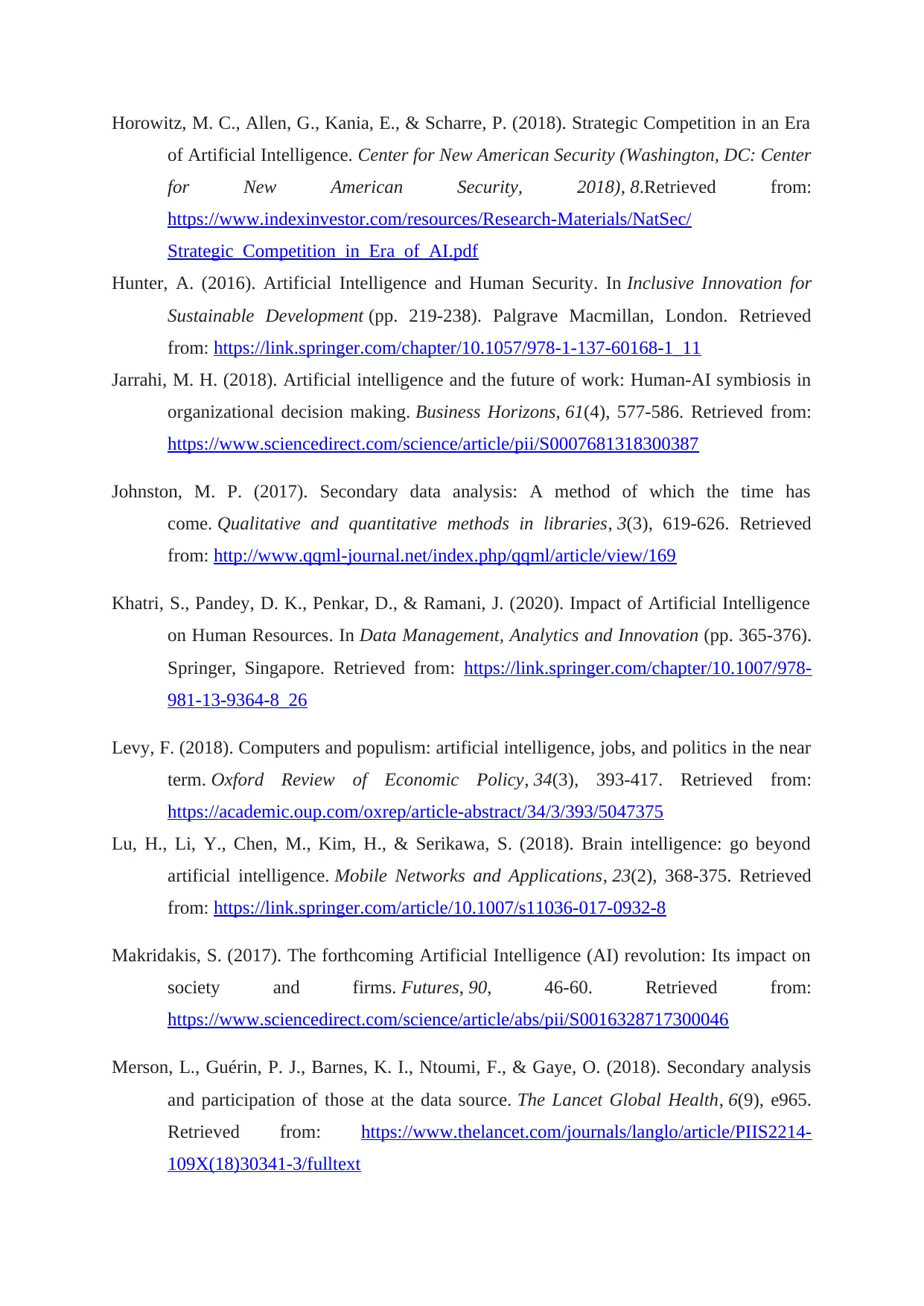
Horowitz, M. C., Allen, G., Kania, E., & Scharre, P. (2018). Strategic Competition in an Era
of Artificial Intelligence. Center for New American Security (Washington, DC: Center
for New American Security, 2018), 8.Retrieved from:
https://www.indexinvestor.com/resources/Research-Materials/NatSec/
Strategic_Competition_in_Era_of_AI.pdf
Hunter, A. (2016). Artificial Intelligence and Human Security. In Inclusive Innovation for
Sustainable Development (pp. 219-238). Palgrave Macmillan, London. Retrieved
from: https://link.springer.com/chapter/10.1057/978-1-137-60168-1_11
Jarrahi, M. H. (2018). Artificial intelligence and the future of work: Human-AI symbiosis in
organizational decision making. Business Horizons, 61(4), 577-586. Retrieved from:
https://www.sciencedirect.com/science/article/pii/S0007681318300387
Johnston, M. P. (2017). Secondary data analysis: A method of which the time has
come. Qualitative and quantitative methods in libraries, 3(3), 619-626. Retrieved
from: http://www.qqml-journal.net/index.php/qqml/article/view/169
Khatri, S., Pandey, D. K., Penkar, D., & Ramani, J. (2020). Impact of Artificial Intelligence
on Human Resources. In Data Management, Analytics and Innovation (pp. 365-376).
Springer, Singapore. Retrieved from: https://link.springer.com/chapter/10.1007/978-
981-13-9364-8_26
Levy, F. (2018). Computers and populism: artificial intelligence, jobs, and politics in the near
term. Oxford Review of Economic Policy, 34(3), 393-417. Retrieved from:
https://academic.oup.com/oxrep/article-abstract/34/3/393/5047375
Lu, H., Li, Y., Chen, M., Kim, H., & Serikawa, S. (2018). Brain intelligence: go beyond
artificial intelligence. Mobile Networks and Applications, 23(2), 368-375. Retrieved
from: https://link.springer.com/article/10.1007/s11036-017-0932-8
Makridakis, S. (2017). The forthcoming Artificial Intelligence (AI) revolution: Its impact on
society and firms. Futures, 90, 46-60. Retrieved from:
https://www.sciencedirect.com/science/article/abs/pii/S0016328717300046
Merson, L., Guérin, P. J., Barnes, K. I., Ntoumi, F., & Gaye, O. (2018). Secondary analysis
and participation of those at the data source. The Lancet Global Health, 6(9), e965.
Retrieved from: https://www.thelancet.com/journals/langlo/article/PIIS2214-
109X(18)30341-3/fulltext
of Artificial Intelligence. Center for New American Security (Washington, DC: Center
for New American Security, 2018), 8.Retrieved from:
https://www.indexinvestor.com/resources/Research-Materials/NatSec/
Strategic_Competition_in_Era_of_AI.pdf
Hunter, A. (2016). Artificial Intelligence and Human Security. In Inclusive Innovation for
Sustainable Development (pp. 219-238). Palgrave Macmillan, London. Retrieved
from: https://link.springer.com/chapter/10.1057/978-1-137-60168-1_11
Jarrahi, M. H. (2018). Artificial intelligence and the future of work: Human-AI symbiosis in
organizational decision making. Business Horizons, 61(4), 577-586. Retrieved from:
https://www.sciencedirect.com/science/article/pii/S0007681318300387
Johnston, M. P. (2017). Secondary data analysis: A method of which the time has
come. Qualitative and quantitative methods in libraries, 3(3), 619-626. Retrieved
from: http://www.qqml-journal.net/index.php/qqml/article/view/169
Khatri, S., Pandey, D. K., Penkar, D., & Ramani, J. (2020). Impact of Artificial Intelligence
on Human Resources. In Data Management, Analytics and Innovation (pp. 365-376).
Springer, Singapore. Retrieved from: https://link.springer.com/chapter/10.1007/978-
981-13-9364-8_26
Levy, F. (2018). Computers and populism: artificial intelligence, jobs, and politics in the near
term. Oxford Review of Economic Policy, 34(3), 393-417. Retrieved from:
https://academic.oup.com/oxrep/article-abstract/34/3/393/5047375
Lu, H., Li, Y., Chen, M., Kim, H., & Serikawa, S. (2018). Brain intelligence: go beyond
artificial intelligence. Mobile Networks and Applications, 23(2), 368-375. Retrieved
from: https://link.springer.com/article/10.1007/s11036-017-0932-8
Makridakis, S. (2017). The forthcoming Artificial Intelligence (AI) revolution: Its impact on
society and firms. Futures, 90, 46-60. Retrieved from:
https://www.sciencedirect.com/science/article/abs/pii/S0016328717300046
Merson, L., Guérin, P. J., Barnes, K. I., Ntoumi, F., & Gaye, O. (2018). Secondary analysis
and participation of those at the data source. The Lancet Global Health, 6(9), e965.
Retrieved from: https://www.thelancet.com/journals/langlo/article/PIIS2214-
109X(18)30341-3/fulltext
⊘ This is a preview!⊘
Do you want full access?
Subscribe today to unlock all pages.

Trusted by 1+ million students worldwide
1 out of 13
Related Documents
Your All-in-One AI-Powered Toolkit for Academic Success.
+13062052269
info@desklib.com
Available 24*7 on WhatsApp / Email
![[object Object]](/_next/static/media/star-bottom.7253800d.svg)
Unlock your academic potential
Copyright © 2020–2026 A2Z Services. All Rights Reserved. Developed and managed by ZUCOL.





